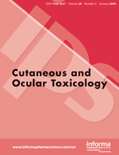
Cutaneous and Ocular Toxicology
Scope & Guideline
Innovating insights into cutaneous and ocular health.
Introduction
Aims and Scopes
- Toxicological Evaluation:
The journal emphasizes the assessment of the toxicity of drugs, chemicals, and environmental factors on skin and ocular tissues, utilizing both in vitro and in vivo models. - Clinical and Preclinical Research:
It publishes studies that bridge clinical insights with preclinical findings, ensuring that research is relevant to real-world applications in dermatology and ophthalmology. - Innovative Treatment Approaches:
The journal covers novel therapeutic strategies for managing skin and ocular diseases, including the use of traditional and herbal remedies, as well as advancements in pharmacotherapy. - Environmental Impacts on Skin and Eyes:
Research exploring the effects of environmental factors, such as pollutants and UV exposure, on skin and ocular health is a core focus, highlighting the growing concern of environmental toxicology. - Interdisciplinary Collaborations:
The journal encourages interdisciplinary research that combines dermatology, toxicology, pharmacology, and environmental science to provide comprehensive insights into skin and ocular health.
Trending and Emerging
- Impact of Environmental Toxins:
There is an increasing focus on the effects of environmental toxins, including heavy metals and pollutants, on skin and ocular health, reflecting a broader societal concern about environmental safety. - Systemic Effects of Dermatological Treatments:
Research investigating the systemic implications of dermatological treatments, particularly in relation to ocular health, is gaining prominence, emphasizing the interconnectedness of bodily systems. - Innovative Biomaterials and Treatments:
New studies are exploring the safety and efficacy of innovative biomaterials in ocular and cutaneous applications, including drug delivery systems and regenerative medicine approaches. - Role of Immune Response in Toxicity:
Emerging research is increasingly examining how immune responses contribute to skin and ocular toxicity, particularly in the context of treatments like immune checkpoint inhibitors. - Herbal and Natural Remedies:
There is a rising interest in the use of herbal and natural remedies for treating skin and ocular conditions, with studies focusing on their efficacy, safety, and mechanistic insights.
Declining or Waning
- Traditional Chemical Toxicity:
Research focused solely on the traditional chemical toxicity of known substances is becoming less frequent, possibly due to a shift towards more complex and multi-faceted studies involving environmental and biological interactions. - Static Ophthalmic Treatments:
Papers centered on static or conventional ophthalmic treatments without a toxicological angle are declining, as the field increasingly emphasizes the need for studies that incorporate safety evaluations and innovative therapies. - Aging and Skin Toxicity Studies:
While aging remains a significant area of research, studies specifically dedicated to skin toxicity mechanisms in aging populations are becoming less common as broader, integrative approaches gain traction. - Single-Agent Drug Studies:
Research focusing exclusively on the effects of single-agent drugs on ocular or cutaneous toxicity is waning, with a trend towards combination therapies and multifactorial analyses.
Similar Journals
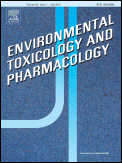
Environmental Toxicology and Pharmacology
Unveiling the complexities of toxicology and health.Environmental Toxicology and Pharmacology, published by Elsevier, is a leading journal dedicated to advancing our understanding of the effects of environmental pollutants on biological systems. With an ISSN of 1382-6689 and an E-ISSN of 1872-7077, this journal covers a wide range of studies related to toxicology, pharmacology, and environmental health. The journal is classified as Q2 in key categories such as Health, Toxicology and Mutagenesis and Medicine (miscellaneous), and sits impressively in Q1 for Toxicology, reflecting its strong impact in the field. As of 2023, it ranks #30 out of 133 in Toxicology and #40 out of 148 in Health, indicating its high relevance and contribution to research. While the journal is not currently open access, it remains a pivotal resource for researchers, professionals, and students seeking to explore the intricacies of environmental health effects. Its commitment to publishing high-quality peer-reviewed research positions it as a crucial platform for scientific dialogue and discovery.
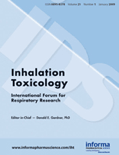
INHALATION TOXICOLOGY
Advancing the Science of Airborne Hazards.Inhalation Toxicology, published by Taylor & Francis Ltd, is a premier journal dedicated to advancing the field of toxicology with a particular focus on inhalation exposure and its impact on human health. Established in 1989, this journal provides a vital platform for original research, reviews, and case studies that explore the toxicological effects of inhaled substances, making it essential reading for researchers, health professionals, and regulatory scientists. With an Impact Factor that situates it in the Q3 category in both Health, Toxicology and Mutagenesis, the journal asserts its relevance within the scientific community, particularly emphasizing its contributions as indexed by Scopus rankings in related fields. Although it follows a traditional access model, the journal's commitment to delivering high-quality research continues to foster significant discussions and advancements in understanding inhalation toxicology. For those at the forefront of environmental science and pharmacology, Inhalation Toxicology is an indispensable resource for both current research and future innovations in the discipline.
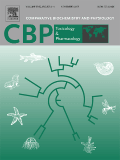
COMPARATIVE BIOCHEMISTRY AND PHYSIOLOGY C-TOXICOLOGY & PHARMACOLOGY
Transforming Biochemical Research into Practical SolutionsComparative Biochemistry and Physiology C-Toxicology & Pharmacology, published by Elsevier Science Inc, stands as a prominent resource in the fields of pharmacology, toxicology, and biochemical research. With its ISSN 1532-0456 and E-ISSN 1878-1659, this journal has carved out a significant niche, focusing on the comparative aspects of biochemical and physiological data across various species. Recognized for its impact in diverse fields, it boasts a Q1 ranking in Animal Science and Zoology, Aquatic Science, Health, Toxicology and Mutagenesis, alongside respectable standings in other related disciplines. Researchers and professionals can leverage this publication to access high-quality, peer-reviewed studies that advance the understanding of biochemical processes and their toxicological implications. The journal aims to bridge the gap between laboratory findings and real-world applications, fostering an environment for interdisciplinary collaboration. For academics seeking to enhance their knowledge or contribute to this impactful field, Comparative Biochemistry and Physiology C-Toxicology & Pharmacology serves as an invaluable platform.
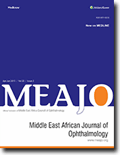
Middle East African Journal of Ophthalmology
Elevating eye care standards across the Middle East and Africa.The Middle East African Journal of Ophthalmology is a distinguished publication dedicated to advancing knowledge in the field of ophthalmology, published by Wolters Kluwer Medknow Publications in India. With a robust focus on contributions that bridge the gap between clinical practices and scientific research, this journal serves as a crucial platform for researchers, practitioners, and students alike. Since its inception, it has consistently disseminated high-impact research, achieving notable recognition with a Q3 ranking in both Medicine (miscellaneous) and Ophthalmology categories as of 2023. Despite being a newer entrant into the scholarly landscape, it features an array of innovative articles, highlighting significant advancements and emerging trends in ocular health. Researchers may access a wealth of knowledge through its open access articles, promoting the dissemination of vital ophthalmic research that is relevant in both Middle Eastern and African contexts. By fostering collaboration and communication among professionals in the field, the Middle East African Journal of Ophthalmology is committed to championing excellence in eye care and elevating the standard of research applicable to global populations.
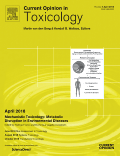
Current Opinion in Toxicology
Navigating the Latest Trends in ToxicologyCurrent Opinion in Toxicology is a premier academic journal published by Elsevier, focusing on the latest advancements and perspectives in the field of toxicology. With an impressive impact factor reflecting its high citation and influence within the research community, this journal ranks in the Q1 category for Toxicology, positioned at #8 out of 133 in the Scopus Toxicology domain, placing it in the 94th percentile. The journal aims to provide concise and insightful reviews of contemporary research, fostering an understanding of critical issues related to toxic effects of chemicals and environmental agents. Although not an open access journal, it attracts a worldwide readership, making it an essential resource for researchers, professionals, and students committed to understanding toxicological science. Based in the Netherlands, Current Opinion in Toxicology serves as a platform for stimulating scholarly dialogue and guiding future research directions in this vital area of study.

JOURNAL OF APPLIED TOXICOLOGY
Elevating Standards in Toxicological ResearchJOURNAL OF APPLIED TOXICOLOGY, published by Wiley, stands as a leading platform in the field of toxicology, focusing on the rigorous examination of chemical substances and their effects on biological systems. With an impressive Impact Factor, it ranks in the top quartile (Q2) for toxicology journals, reflecting its esteemed position within the scientific community. The journal, identifiable by its ISSN 0260-437X and E-ISSN 1099-1263, has been an invaluable resource since its inception in 1981, and it continues to serve as a conduit for innovative research and practical applications through 2024. Positioned at the forefront of the field, it garners recognition in the Scopus Rankings, where it ranks #31 out of 133 journals in the toxicology category, placing it in the 77th percentile—a testament to its contribution to the advancement of pharmacology and toxicological sciences. While not an open-access journal, it remains accessible to a wide audience of researchers, professionals, and students eager to explore cutting-edge findings in applied toxicology, making it a pivotal resource for enhancing knowledge and fostering collaboration in the field.
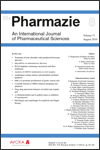
PHARMAZIE
Fostering excellence in pharmaceutical scholarship.PHARMAZIE is a prestigious, peer-reviewed journal published by AVOXA-MEDIENGRUPPE DEUTSCHER APOTHEKER GMBH, focusing on the dynamic field of pharmaceutical science since its inception in 1947. With its ISSN 0031-7144 and a current impact factor placing it in the Q2 category of Pharmaceutical Science journals, PHARMAZIE has established itself as a pivotal resource for researchers, practitioners, and students alike. The journal emphasizes the dissemination of high-quality, original research in pharmacology, toxicology, and pharmaceutics, contributing to the advancement of knowledge and innovation in these fields. While currently not open access, the journal maintains a commendable Scopus rank of #94 out of 183 in its category, highlighting its relevance and appeal to the academic community. With a commitment to bridging the gap between research and practical applications, PHARMAZIE plays a crucial role in shaping the future of pharmaceutical practices and policies.

GRAEFES ARCHIVE FOR CLINICAL AND EXPERIMENTAL OPHTHALMOLOGY
Elevating Clinical and Experimental OphthalmologyGRAEFES ARCHIVE FOR CLINICAL AND EXPERIMENTAL OPHTHALMOLOGY, published by Springer, has established itself as a premier journal in the field of ophthalmology since its inception in 1870. With an ISSN of 0721-832X and an E-ISSN of 1435-702X, this esteemed journal enjoys a notable impact in the research community, ranking Q1 in Ophthalmology and Q1 in Sensory Systems, as per the latest 2023 journal category quartiles. GRAEFES Archive is dedicated to advancing our understanding of ocular health through both clinical and experimental studies, making it an essential resource for researchers, practitioners, and students alike. Its comprehensive scope covers various aspects of ophthalmic science, reflecting its long-standing commitment to quality and excellence. Although it currently operates on a subscription basis, the journal's significant Scopus rankings—24th out of 137 in Ophthalmology—underscore its relevance and influence within the scientific community. Situated in Germany, with its address in the United States, this international journal continues to shape the discourse on vision science and therapeutic innovation.
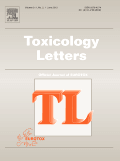
TOXICOLOGY LETTERS
Advancing toxicological insights for a safer tomorrow.TOXICOLOGY LETTERS is a prominent journal dedicated to advancing the field of toxicology, providing a platform for high-quality research and reviews that explore the effects of chemical substances on biological systems. Published by Elsevier Ireland Ltd, this peer-reviewed journal has established itself as a vital resource in toxicological research since its inception in 1977, with a convergence of studies extending to 2024. With an impressive Scopus ranking, positioned at #28 out of 133 in the Toxicology category, TOXICOLOGY LETTERS garners a respectable percentile of 79, highlighting its significance in the academic community. Although it is not an open-access journal, its research is accessible through institutional subscriptions, ensuring that critical insights into human health and environmental safety are disseminated effectively. Being categorized in the Q2 quartile in both Medicine (miscellaneous) and Toxicology for 2023 further emphasizes its relevance and impact in these fields. This journal aims to foster collaboration between researchers and professionals, encouraging the exploration of innovative solutions to chemical hazards and the promotion of safer practices in pharmacology and toxicology.

Forensic Toxicology
Unraveling the Mysteries of Toxic SubstancesForensic Toxicology is a premier journal published by Springer, renowned for delivering cutting-edge research in the realms of toxicology, biochemistry, and forensic medicine. With an ISSN of 1860-8965 and an E-ISSN of 1860-8973, this journal has established itself as a significant resource for professionals, researchers, and students engaged in the analysis of toxic substances within a forensic context. Its impressive impact factor and ranking reveal its influential presence in the field, particularly as it is categorized in Q1 for Pathology and Forensic Medicine and Q2 for Biochemistry (Medical) and Toxicology. Featured articles span a wide array of topics, facilitating interdisciplinary collaboration and advancing scientific knowledge. While currently not an open-access journal, it remains accessible through institutional subscriptions. With a convergence span from 2006 to 2024, Forensic Toxicology is committed to publishing high-quality research that enhances the understanding of toxicological phenomena and their implications in forensic investigations, reinforcing its role as an indispensable resource in the scientific community.